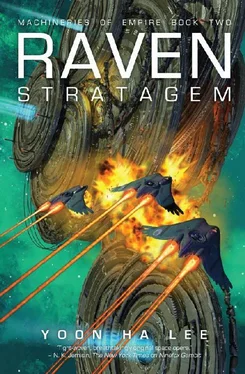“Not perfect anymore.”
“Stop being modest, my dear. The Hafn were routed, even if they failed to be obliterated. Anyway, we had some indication that you were slipping Kel Command’s control. The thought of you running off and randomly slaughtering another million people—more, if you put your mind to it—bothered me. In that context, sacrificing 8,000 people to be sure of putting down a ruthless and effective killer was a bargain.”
“Then why not leave me to rot in the black cradle?”
“Because we had to win back the Fortress of Scattered Needles, and—don’t tell Kel Tsoro about this bit, she dislikes me enough already.” True as far as it went. “Only one of the available Kel generals was deemed good enough to crack invariant ice and handle the situation, Kel Inesser. But Kel Command didn’t want to hand her that victory because she’s too popular with her own troops, and they think she’s a potential threat to them.”
Jedao’s mouth twisted. “Not that we’re on the same side, Shuos-zho, but has Kel Command ever in the past four centuries considered that it might be better not to field generals it doesn’t trust?”
“I’m not a soldier, so I don’t feel qualified to comment,” Mikodez lied. “It wasn’t a good solution, but it was a damn sight better than ceding the Fortress of Scattered Needles to Hafn control. It was also better than letting you charm your way out of captivity afterward. I admit we didn’t see your solution coming, even if everyone realizes that the Kel are expendable.”
Jedao didn’t fall for the bait. But then, his control had been moderately good during the previous conversation, and Mikodez was working his way up to the harder questions. “What do you seek to gain from this chat, Shuos-zho?” Jedao asked.
“I’m not going to tell you that I have your best interests at heart, because I don’t, and no one should believe a Shuos making facile remarks anyway.” He could tell that Jedao was refraining from making a sarcastic rejoinder. “But the fact remains that you’re a Shuos, even if Kel Command thinks you’re pretty in that uniform. That means you’re one of mine. Every time you hare off course, I’m responsible.”
“Shuos-zho, you don’t need to break it down into words of one syllable for me. They were teaching this stuff four centuries ago, you know.”
Mikodez quirked an eyebrow. “We’ll just agree that we both speak fluent Shuos and go from there.”
Jedao leaned back. “Are you looking for assurances? You’ll notice that I’ve aimed my guns consistently at the Hafn and not your moths or cities. That Shuos commandant of yours should have told you that I offloaded all my threshold winnowers. I know people are, shall we say, sensitive about them. Although maybe it’s a bit much to expect forthrightness from someone who spent her career under deep cover.” He smiled briefly, ironically.
“No, she was frank about that,” Mikodez said. He had instructed Zehun to find Mazeret the posting of her choice in return for her extraordinary service. “But Jedao, it can’t have escaped your notice that the only people who will ever ‘trust’ you are people who have no choice in the matter. You can’t expect to convince me of your sincerity. I’m not a Kel, and we were both trained to be paranoid.”
“I know,” Jedao said, very quietly. “But it doesn’t matter. I refuse to return to the cradle. There’s no light in there. If I have to run out of the hexarchate and turn mercenary, then fine. That’s what I’ll do.”
“You’ll kill a lot more people that way. You have a talent for it.”
“I know.”
“You didn’t ask for this assessment,” Mikodez said, “but I’ll give it to you anyway. Did it never occur to you that if you’d been a standard-issue happy-go-lucky sociopath like the rest of us foxes, instead of a Crowned with Eyes visionary, a lot more people would be alive and a lot less evil would have been done?”
Ninefox Crowned with Eyes was Jedao’s signifier. During his lifetime it had been interpreted as an indication of his brilliance. But visionaries and the mad sometimes turned up with it, and they all knew how that story ended.
“If you were a ‘standard-issue happy-go-lucky sociopath’ yourself,” Jedao retorted, “you wouldn’t give a fuck about lives saved or lost.” His gaze shifted sideways. “Fox and hound, Shuos-zho, are you growing a vegetable on your desk? Is there a food shortage in the Citadel? I would have recommended something that offered a little more sustenance, personally.”
Transparent change of topic, which Mikodez had expected. Besides, it was nice to see Jedao taking an interest in something that wasn’t ordnance. Maybe he should send the swarm some cuttings? “That’s what my assistant said. Every so often I snip some leaves to put in my soup. Speaking of which, how are you enjoying Kel food? Is it very different from what you used to eat?”
“Don’t recognize what they’ve done to the pickles,” Jedao said drily, “and I’m afraid to ask about some of the fish. If they’re fish at all. So how many hexarchs has your assistant served?”
At least Jedao still recognized Shuos power structures. The Shuos who made a play for the hexarch’s seat were almost always foxes. Even then, only the vainglorious, the rabidly ambitious, or the terminally bored bothered with the exercise. (Mikodez thought of himself as a category three.) No: if you wanted to wield lasting influence, you skipped the dramatics, became a bureaucrat, and made yourself too indispensable to purge.
“I’m Zehun’s third hexarch,” Mikodez said matter-of-factly. “Of course, my predecessor only lasted three years before I happened to him.”
“Bullet? Poison? Point-blank knitting needle?”
Jedao had never had much imagination, even for Shuos infantry. “He was having a nervous breakdown,” Mikodez said. “He wanted to retire somewhere quiet and change his face and sex and, I’m not making this up, breed cockatiels. I visited her once afterward, to make sure she was doing all right. Lovely birds, cockatiels. I often think she got the better end of the deal, especially when I have to deal with budget allocations and my agents whine about not getting all the latest toys. Anyway, my assistant had to talk me out of bringing one of the birds home as a pet. Zehun’s such a killjoy sometimes.”
Jedao looked bewildered. “I realize it’s impertinent of me to ask, Shuos-zho, but why did you decide to become hexarch? Instead of taking up landscape architecture or tiger-taming or anesthesiology?”
Mikodez grinned at him. “Because I’m good at it and it’s fun. Not necessarily in that order. Honestly, even some of the Kel figure out that duty can be fun. You have some peculiar knot in your psyche that says everything has to be about suffering. But then, considering that you’re practically half-Kel, it’s not surprising you react like a hawk.”
Pointedly, Jedao held up his left hand and inspected his half-glove. “It’s just a uniform, Shuos-zho. You do have my transcripts from Shuos Academy, don’t you?”
“Yes, and I also happen to know how hard you had to work not to fail out of those math classes. But I’m not joking. At one point you had formation instinct.” Mikodez studied Jedao’s face intently. Thirty-five years later and they were winding back to the part of the conversation that Nirai Kujen had so disapproved of. They’d quarreled afterward, and then Zehun had yelled at Mikodez for getting into a fight with the Nirai hexarch on his home station. Worth it, though.
Jedao scoffed. “That’s preposterous. I’d know if they’d made me into a counterfeit Kel. Even outprocessing can’t suppress a memory that—” He fell silent, eyes going opaque as the uncertainty hit.
Читать дальше












